

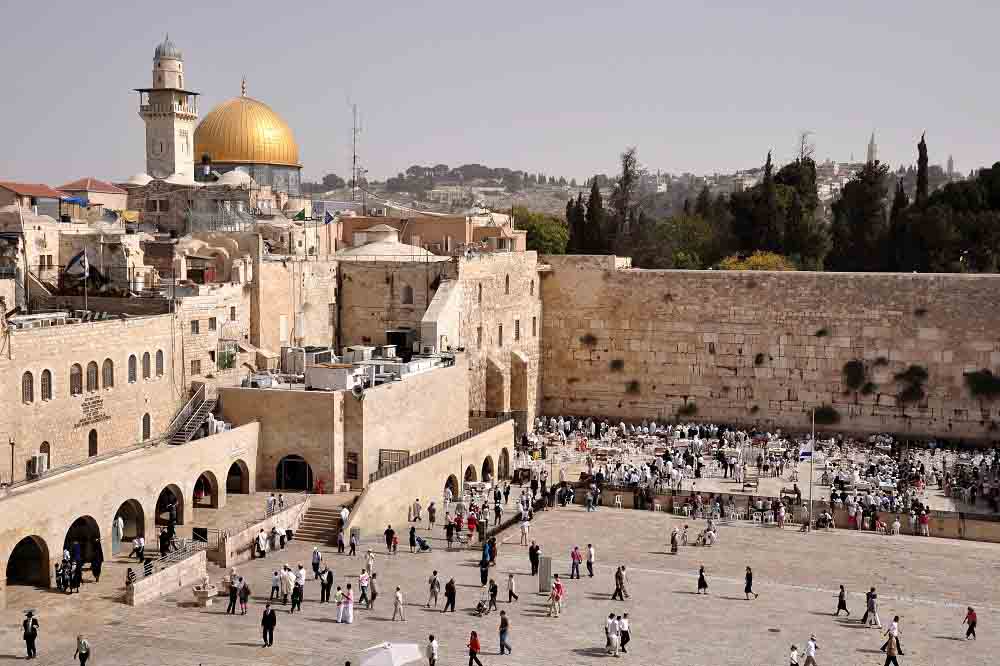
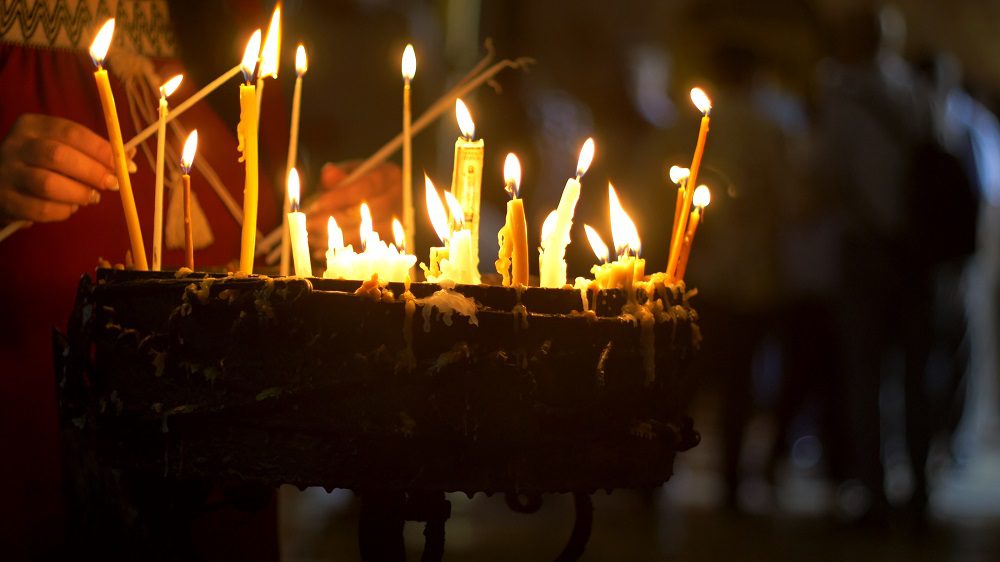
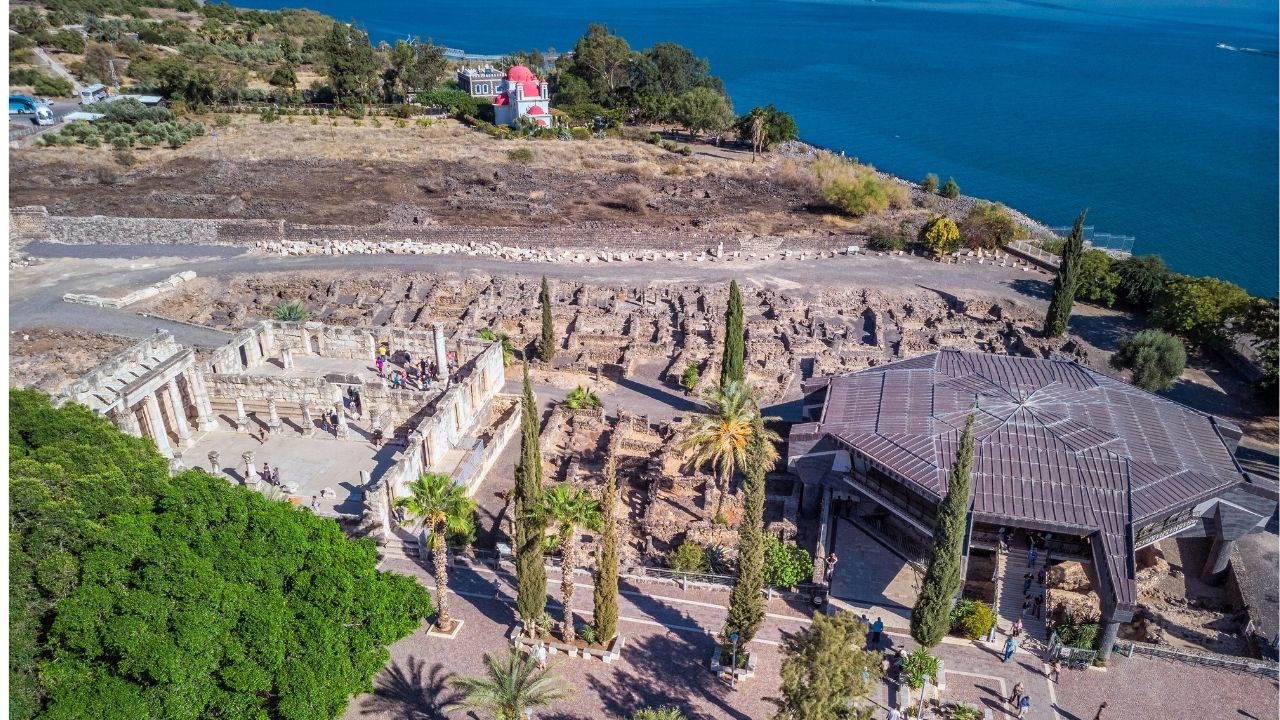
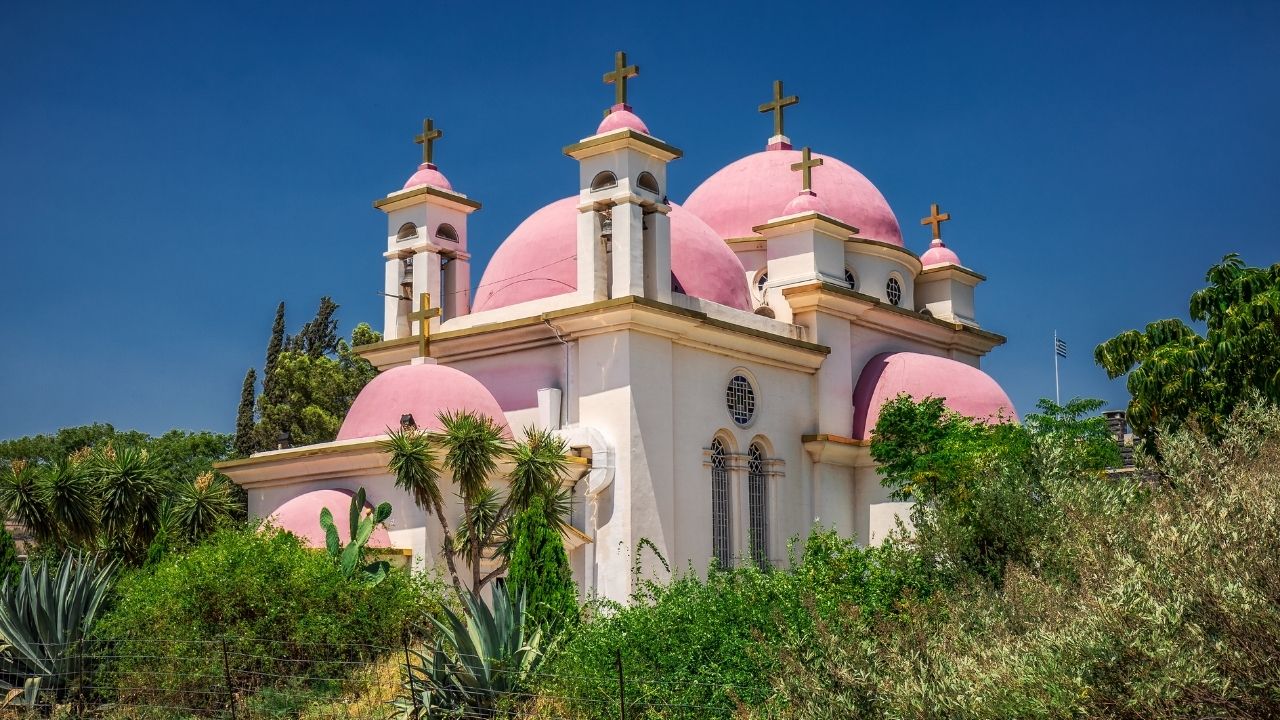
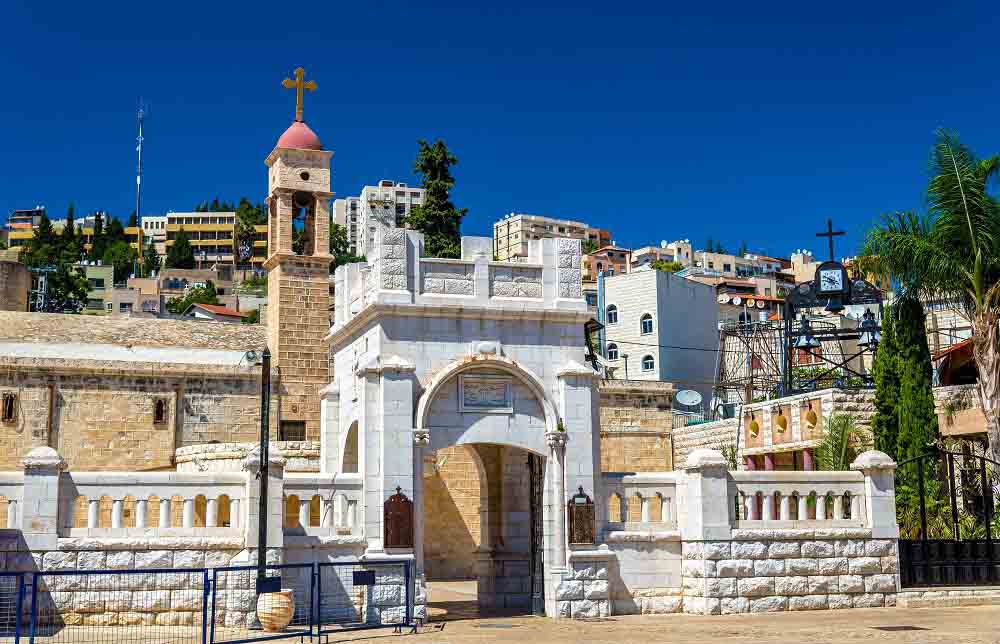
SAMPLE TOUR FOR GREEK ORTHODOX CHURCH GROUPS ONLY
This tour offers a remarkable opportunity to get back to your roots and to make life-changing connections between the words of your Faith and the Living Word, Jesus Christ. Regardless of being denominational affiliated, the tour is open to everyone who is fascinated to see and to experience unique places, where the books of the Bible were written.
We welcome bridge-building and greater understanding of religious traditions and different cultures. The tour is personally escorted by Father Ilya and begins in Nazareth and ends in Jerusalem.
Your Land Cost includes:
Your Land Cost does NOT include:
Note:
Rules on the road:
Passport and Visa:
Security:
Medication:
Church and services:
Currency:
Note:
Rules on the road:
Passport and Visa:
Security:
Medication:
Church and services:
Currency:
Dress code:
Be sure to bring:
*Site under the Palestinian Authority Jurisdiction – visit subject to situation
**Visit subject to weather conditions
***The sequence of the tour, border crossing point used, hotels used and sites visited may be amended due to circumstances
****Men must cover their head while in the prayer area and women must cover their shoulders and wear long pants or a knee-length skirt. If you forget to bring a covering, guards will provide you with a piece of fabric for that purpose before you enter. The prayer area is separated by gender. If you want to be super respectful follow Jewish custom by never turning your back on the wall. You will see many people walking away from the wall backwards because it is simply disrespectful to turn away.
Be sure to bring:
For information and reservations contact, Janice Snider.
Arrival in Tel Aviv, Israel. Transfer to Nazareth for dinner, orientation and overnight.
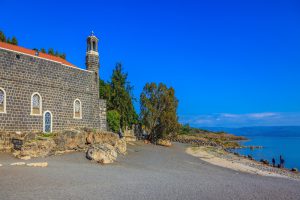
The Church of the Primacy – Tabgha
Greek Orthodox Pilgrimage to the Holy Land will begin with visits to the sites around the “sea” of Galilee. First visit of the day will be to Magdala, to see recently uncovered synagogue from the time of our Lord, then onto Genosar to see “Jesus’ boat”. From here on to Tabgha to pray at the place of the miraculous Multiplication of the Loaves and Fishes.
After lunch, we will visit the ruins of Capernaum, the very town that the Gospel writer calls “His own city” (Matt 9:1) to see the remains of Peter’s house and the synagogue where He preached. Adjacent to the ruins that are in the custody of the Franciscans, there is a beautiful Church of the 12 Apostles that we plan to visit as well. Our last visit of the day will be to Kursi, the place where the Lord healed the Gadarene demoniacs and where the herd of swine rushed into the sea and drowned. Dinner and overnight in Nazareth B/D
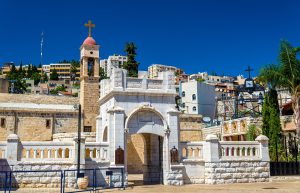
Greek Orthodox Church of the Annunciation in Nazareth
On our second day in Galilee, we will start in the town of Nazareth, where the good news to the World was announced by the Archangel Gabriel to the Virgin Mary and where Christ spent His young years with His Most-Holy Mother and the righteous Joseph. There are two important churches in town that share the glory and importance of the event. One is an Orthodox Church built over a well with a spring where according to local tradition the Archangel Gabriel appeared to the Virgin Mary.
Another shrine is the much larger Catholic foundation that is built over the remains of the house of the carpenter Joseph. Just before lunch, we will ascend to Mt. Tabor, the place of the Lord’s glorious and wondrous Transfiguration.
Political situation permitting, we will stop in Burquin, to pray at the church of “ten lepers” constructed adjacent to the site where poor sickly exiled were bound to live, and at Jacob’s well in the city of Nablus, known in the Bible as Shechem and famous as the site of the conversation of our Lord with the Samaritan woman (John 4). For dinner and overnight, we will arrive at Bethlehem. B/D
Today we will start our day with a visit to the Basilica of Nativity in Bethlehem, founded on the spot of the birth of our Savior. From here we will proceed to Shepherd’s Field, to a Greek monastery that is marking the traditional spot of the apparition of Angels that brought good news about the Birth of Messiah to simple, but pious shepherds.
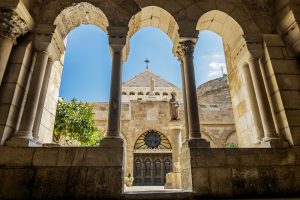
View of the Church of the Nativity Bethlehem
The next stop will be deep in the Judean desert to venerate the most prominent fathers and spiritual leaders of Palestinian Monasticism – St. Sabba the Sanctified and Venerable Theodosios the Cenobiarch. The Lavra of St. Sabba is open for males only, so we have to advise our female pilgrims that they will only be able to observe the monastery from a “bird’s eye view” – from an observation deck in an ancient defence tower nearby.
After lunch, we will travel to Hebron, to visit Machpelah or the cave of the Patriarchs. It is impossible to enter the cave itself, but we could visit an imposing structure built by Herod the Great above the spot of the burial of the Patriarchs. For dinner and overnight, we will remain in Bethlehem. B/D
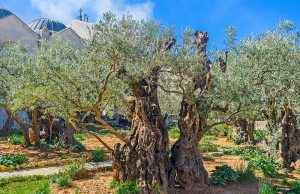
The Gethsemane Garden in Jerusalem.
Today we will start in Bethany, one of the sites not too far from Jerusalem that the Lord loved to visit because His friends Mary, Martha, and their brother Lazarus lived there. Here we will visit the Tomb of Lazarus and the Russian Ecclesiastical School for Palestinian girls. From here we will proceed to the Monastery of our Lord’s Ascension on Mt. of Olives.
Our Greek Orthodox Pilgrimage to the Holy Land continues by descending Mount of Olives, to the Valley of Kidron following the Entrance of our Lord into Jerusalem and His Saving Passion. Our first stop will be at the “Tomb of the Prophets” an interesting underground catacomb-like structure, known as one of the earliest places for Christian worship in the Jerusalem area. Just down the road, there is a site known as “Dominus Flevit” or “Lord wept”.
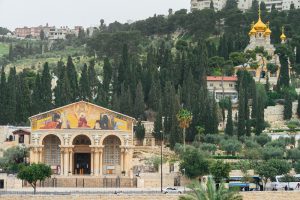
The church of All Nations on Olive Mountain in Jerusalem
From here the most beautiful panorama of the Holy City unfolds before your eyes and it is here that our Savior wept over the city and its inhabitants that so terrifyingly rejected their salvation. Convent of St. Mary Magdalene – a Russian Imperial foundation that houses the remains of the martyred Grand Duchess Elisabeth. Practically adjacent to the site is the Garden of Gethsemane, the beginning point of Christ’s Passions with splendid Basilica of Agony. We will return to Bethlehem for dinner and overnight. B/D
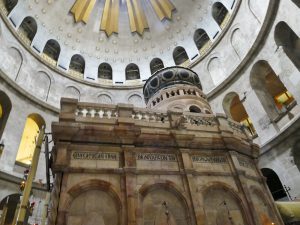
Church of the Holy Sepulcher
Today, the Greek Orthodox Pilgrimage is heading to the Holy city to visit the sites associated with our Lord’s passion. Our first stop will be at the Church of the Holy Sepulchre, a large ecclesiastical complex that among other wondrous things, encompasses some of the most important places of Christendom: the Golgotha, the stone of anointing and the Tomb of the Lord, place of His Glorious Resurrection.
After our visit to the Church of the Resurrection, we will explore other sites associated with Lord’s Passion: the Judgement gate, the Prison, Lithostrotos, and the sheep’s pool or “Bethesda” – the site where our Lord healed the paralytic (John 5). Dinner and overnight at the hotel in Jerusalem (in March tour)/Bethlehem (in October tour). B/D
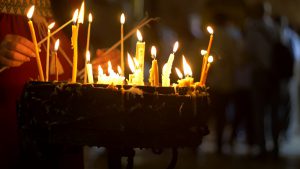
Holy Sepulcher Church in Jerusalem
Very early in the morning, shortly past midnight, we will arrive at the Church of the Holy Sepulcher for a midnight office that includes Matins and Divine Liturgy. Service will last till about 3:30 am. After the service, we will return to the hotel and will rest till about 9:30 am. At that time, we will have breakfast and will continue our visits to the Holy Sites. On our way to Jericho, we will stop at the Museum of the “Good Samaritan” built on the spot of the Ottoman inn and the ruins of the Byzantine Monastery. The collection of the museum provides an interesting insight into the history of the Byzantine monks of the Judean desert and the Samaritans.
For lunch, we will stop by the Dead Sea. Those who desire will have an opportunity to float. From there on we will travel to visit the Monastery of St. Gerasimos of Jordan, and the city of Jericho, one of the oldest continuously inhabited cities in the World. Dinner and overnight at the hotel in Jerusalem (in March tour)/Bethlehem (in October tour). B/D
Today will be your day at leisure.
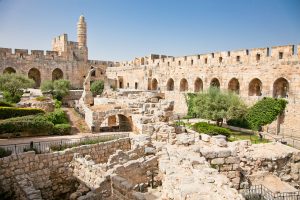
Tower of David, Archaeological park, Jerusalem, Israel
For those of you who would like to participate, we are happy to offer an Archaeological journey through Jerusalem that will include visits to the excavations of the City of David, with the dry tunnel, Pool of Siloam, Davidson Archaeological Park that surrounds the Temple Mount, the Jewish quarter of Jerusalem with the Roman cardo and ancient fortifications of pre-Babylonian Jerusalem, and the National Museum of Israel with an interesting scale model of Jerusalem (as of 1 century AD) and spectacular collection of Antiquities covering all of the Biblical periods. Dinner and overnight at the hotel in Jerusalem (in March tour)/Bethlehem (in October tour). B/D
This morning after checking out from the hotel, Greek Orthodox Pilgrimage to the Holy Land is heading to cross the border with Jordan.
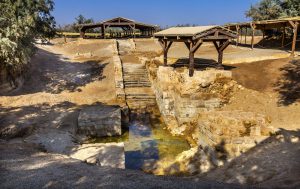
Bethany Beyond Jordan
Our first visit of the day will be to the site that recently was identified as the most probable place of “Bethany beyond Jordan” – the place of our Lord’s baptism, also not far from the hill from where according to tradition St. Prophet Elias ascended to Heaven in a fiery chariot. The area is historically very significant and marked with many Byzantine ruins.
The vicinity of the site is also closely associated with the Venerable Mary of Egypt and her cult is very prominent among local Christians. From Bethany, we will proceed to Mt. Nebo. The law-giver Moses observed the Promised Land from this mountain and this is the closest he ever got to the place where He so much desired to be. For lunch, we will return to Madaba – a little village housing Byzantine Churches with very important mosaics, among them, one depicting the map of the Holy Land. From here we will transfer to the “rose city” of Petra for dinner and overnight. B/D
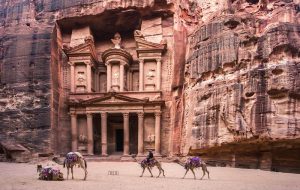
The temple-mausoleum of Al Khazneh in the ancient city of Petra in Jordan
Petra is the most intriguing Nabatean city carved in rock cliffs. This is a historical monument really “one of its kind anywhere in the world.” We will spend most of the day exploring ancient ruins and temples, fortifications, theatre, and other buildings carved into the rock. In the morning, prior to our main visit of the day, we will explore the site of Little Petra, located just some miles away from its more famous neighbour. For dinner and overnight, we will remain in Petra. B/D
This morning we will leave Petra and will be re-tracking our way back to Madaba. Along the way, we will stop to see Shobak Castle which was originally called Krak de Montreal or Mons Regalis and was the first Crusader outpost beyond the Jordan River.
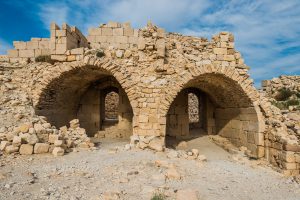
Shobak crusader castle fortress, Jordan
King Baldwin I of Jerusalem built this mighty castle to guard the road from Egypt to Damascus. It resisted many sieges, but in 1189, it fell to Saladin’s troops. The towers and walls are well preserved and decorated with carved Islamic inscriptions dating back to the 14th century.
From here we will transfer to the deserted Byzantine camp-settlement of Um Rassas, with the remains of an important monastic complex where probably the only surviving column of an ascetic (stylite) still stands. Our last stop of the day will be at Mukawir – the site of Herod’s palace, where the sorrowful events of the end days of St. John the Baptist most likely took place. For dinner and overnight, we will arrive in Madaba. B/D
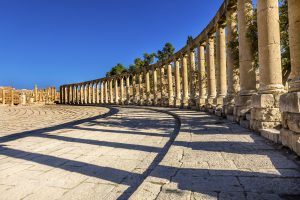
Ancient Roman City Jerash Jordan.
This morning we will travel North to visit the Archaeological Park in Jerash, which is the site of some of the largest and better-preserved ruins of one of the major cities of the historical and Biblical Decapolis.
For its state of preservation, this archaeological park has gained the nickname of “Pompeii of the East”. On our way back we will have a drive-through tour of Amman and will arrive back in Madaba for an early dinner. B/D
*Site under the Palestinian Authority Jurisdiction – visit subject to situation
**Visit subject to weather conditions
***The sequence of the tour, border crossing point used, hotels used and sites visited may be amended due to circumstances
****Men must cover their head while in the prayer area and women must cover their shoulders and wear long pants or a knee-length skirt. If you forget to bring a covering, guards will provide you with a piece of fabric for that purpose before you enter. The prayer area is separated by gender. If you want to be super respectful follow Jewish custom by never turning your back on the wall. You will see many people walking away from the wall backwards because it is simply disrespectful to turn away.
B = breakfast L= lunch Dinner = dinner